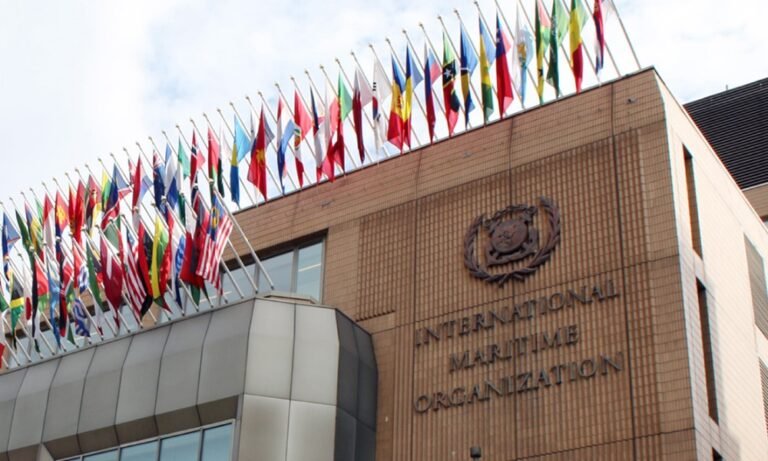The need for a vote and the number of abstentions spoke volumes about Friday’s conclusion of the 83rd gathering of the Marine Environmental Protection Committee at the London headquarters of the International Maritime Organization (IMO).
The final agreement on mid-terms measures was branded “weak” by Dr Nishatabbas Rehmatulla, principal research fellow at London’s UCL Energy Institute as it does not reduce the sector’s emissions in line with targets in the IMO’s revised greenhouse gas (GHG) strategy. However, it does send a signal on the phase out of fossil fuels.
The agreement constitutes a fuel standard, as such a mandate on the GHG intensity of energy used, coupled with a pricing and trading mechanism.
Ships that do not reduce their intensity of GHG emissions – including carbon dioxide, methane and nitrous oxide — in line with two reduction trajectories outlined in the new regulations, which still need to be promulgated at the next MEPC in October, are deemed to have an emissions deficit.
Saudi Arabia, the US and fossil fuel allies blocked progress at every turn
This must then be addressed by buying so-called remedial units. For compliance with a so-called base target trajectory, the units will cost $380 per ton of CO2-equivalent emissions. For what is called a direct compliance target, they’ll cost $100. Both prices are only for 2028-2030, with future figures to be decided at a later date.
The IMO, for its part, hailed the new net-zero framework, due to come into force in 2027, as the first in the world to combine mandatory emissions limits and GHG pricing across an entire industry sector.
“The approval of draft amendments to MARPOL Annex VI mandating the IMO net-zero framework represents another significant step in our collective efforts to combat climate change, to modernise shipping and demonstrates that IMO delivers on its commitments,” commented IMO secretary-general Arsenio Dominguez.
Many states had been pushing for a universal carbon levy at last week’s MEPC, something that was quashed. The controversy surrounding the green summit saw the US delegation not even show up at the IMO, while the compromise deal was submitted to a vote.
Formal votes at the IMO are extremely rare. The outcome of the vote was 25 countries abstained, 63 member states were in favour, and 16 opposed.
The levels of revenues expected from the current policy specifications of approximately $11 to $12bn per annum were deemed insufficient by UCL Energy Institute relative to the scale required to both support early adoption of zero near zero fuels, and to fund a just and equitable transition.
“Consequently, this revenue shortfall may create a competitive tension between these two objectives, thus, increasing the likelihood that neither objectives can be achieved at a level sufficient for climate and equitability,” UCL Energy Institute stated in a readout following the end of the environmental gathering.
A disgruntled Ralph Regenvanu, Vanuatu’s minister of climate change adaptation, meteorology, geo-hazards, environment, energy, and disaster management, said: “Let us be clear about who has abandoned 1.5°C. Saudi Arabia, the US and fossil fuel allies pushed down the numbers to an untenable level and blocked progress at every turn. These countries – and others – failed to support a set of measures that would have gotten the shipping industry onto a 1.5°C pathway. And they turned away a proposal for a reliable source of revenue for those of us in dire need of finance to help with climate impacts.”
Wilfried Lemmens, managing director of the Royal Belgian Shipowners’ Association, expressed frustration at the lack of a universal carbon levy.
“The Royal Belgian Shipowners’ Association regrets that the IMO member states have not succeeded in agreeing on a global levy, as this would have been the simplest and most efficient way for the maritime sector to achieve the climate objectives,” he said.
More upbeat, Guy Platten, the outgoing secretary-general of the International Chamber of Shipping, said: “Today will hopefully be remembered as a historic moment for our industry. If formally adopted, shipping will be the first sector to have a globally agreed carbon price.”
While conceding Friday’s agreement was not perfect, Platten said he hoped it would provide the certainty which energy producers urgently need to de-risk their huge investment decisions.
“The compromise reached by IMO member states is clearly not up to the challenge that awaits the shipping sector,” said Bastien Bonnet-Cantalloube, an expert on transport decarbonisation oat Carbon Market Watch., commented: ”Not enough emission reductions, not enough emissions priced, not priced high enough, not enough revenues. By ignoring the problem, the IMO will not make it go away. This marks a missed opportunity to set an example for other sectors to agree on ambitious global measures for their decarbonisation. Governments in the IMO clearly have work left to set the course for a just and ambitious decarbonisation pathway for international shipping. More ambitious regional and industry actions are needed to make up for this blatantly weak deal.”


